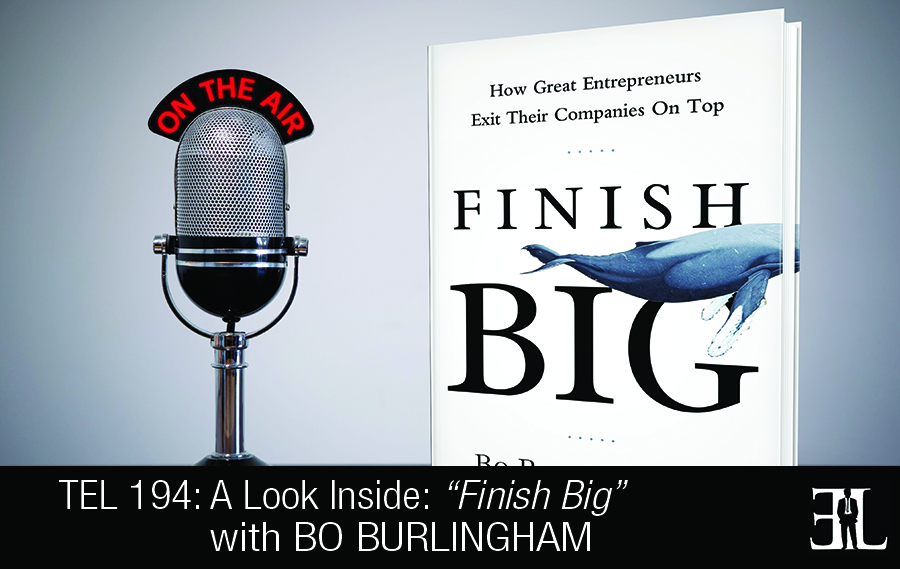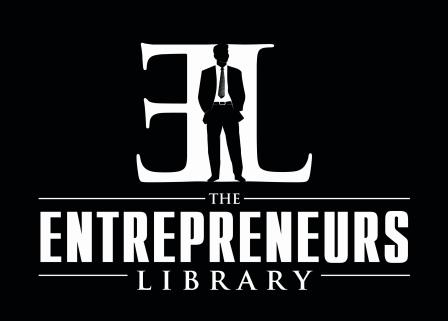A Preview of Finish Big with Bo Burlingham

A summary of things you should know about Finish Big according to Bo Burlingham:
Introduction
In this episode Bo Burlingham takes a deep dive into his book, Finish Big, where he discusses how great entrepreneurs exit their companies on top.
In his book Burlingham dissects dozens of interviews he made with entrepreneurs that have left their companies and pieces together actionable information that all business owners must know about creating a solid exit plan. The goal of the book is to help you find the right time to exit a business, overcome the stress of leaving a company, and leave your company in better shape.
This book is perfect for seasoned entrepreneurs who are close to meeting all their business goals and are ready to start planning an exceptional exit from their organization.
The Book’s Unique Quality (5:14)
There are very little amount of books out there on exiting your business and the ones that are out there are all about the financial side of it. This book focuses on the emotional side of things after exiting your business. There are true stories of people who have sold their business and explain what they went through good and bad.
The Best Way To Engage (7:09)
I tried to set the book up so that the reader could jump and in out where needed but you can also read straight through.
The Reader’s Takeaway (23:23)
If it was only one thing that you could take out of the book I would say it is that you need to start preparing for it early. There is no point that is too early to start preparing and thinking about your exit.
A Deep Dive Into The Book (8:20)
What you will find throughout the book is stories of real people having real experiences in exiting their business.
The introduction is the story of how the book came to be written. I wanted to know the difference between a good exit and a bad exit and in order to do that I had to figure out what a good exit was. I came up with five qualities of a good exit and one is that at the end of the process you feel as though you’ve been fairly treated and appropriately rewarded for the work that you did in building the business. Number two is that you have a sense of accomplishment and you can look back with pride on what you did when you had the business. Number three you are at peace with what has happened to the other people who were on the journey with you. Number four is that you have a new sense of purpose outside the business. And finally it is important to some that the company is still thriving without them.
Chapter one begins with a story of a very good exit and the title of the chapter is Every Journey Ends. You must think about your experience as a business owner as a journey and it’s a journey that has a beginning, middle, and an end. Building a company is the middle of the business and the end of the business is when you decide to leave that company. The other thing I want people to understand is the exit is a phase of the business and not an event. You have the startup phase, you have the growth phase, you have the maturity phase, and you have the exit phase. There are four stages to the exit stage; the first one is what I call the exploratory phase which is when you are educating yourself about what the possibilities are. The second stage to the exit phase is the strategic phase which is when you have an idea of the kind of exit you want and you go about building into your company the qualities that are going to allow you to have that kind of an exit. The third phase is the execution phase, when you actually go out and look for a buyer. Most people start at the third phase without going through phases one and two and it’s a huge mistake. The fourth phase is the most difficult and that’s the transition phase. That’s after you’ve sold the business, what happens between the sale of the business and whatever comes next.
When I looked at the difference between the good and bad exits I came up with seven and a half factors and I really structure the book around those factors. So chapter two is titled Who Am I If Not My Business and it’s about the importance of knowing who you are, what you want, and why. This is something that I have found over and over again in all the years that I have been covering entrepreneurs. Those who do best in terms of building a business and do best in terms of exiting a business have worked very hard on trying to figure out who they are, what they want, and why. The second factor has to do with building a company that’s sellable and what I mean by that is one you can sell when you want, to whom you want, at a price you want. There is something called a forced sell and that happens when something you totally don’t foresee comes along when you have a very good company and all the sudden something happens that catches you by surprise and then you are forced to sell it. It’s very important to understand what a sellable business is and I write about the eight factors that go into it and I also give you other places to go to learn about building a sellable business. The third factor has to do with time. Most business owners do not give themselves anywhere near enough time to do the preparatory work and when I talk about time I am talking in terms of years, not months. The fact is there is no point too early to start at least the exploratory phase and you can do that even before you start the company. The next point is related to not having enough time and that’s about having a successor. And for a lot of people you need to give yourself a lot of time to have a successor.
Chapter six has to do with making sure you get the advice you need and I make a very strong case in here for making sure you have a guide who has been through himself or herself before. These guides have a perspective on it that is different from the perspective you will get from an exit professional because they know the exit doesn’t end with the deal. It’s not over for the business owner and you need somebody guiding you who will understand that. The next factor has to do with what happens to the other people who you’ve been on the journey with. Nobody builds a company alone and you need to be at peace with whatever is going to everyone else who has been with you on the journey.
The sixth factor is what I call Let the Seller Beware. If you are selling a business it’s easy to forget that the buyer is also selling themselves, they are selling themselves that they are going to be a good owner of the company. It’s very important to understand why the buyer wants your business.
The final chapter is called Over The Rainbow and after the sell itself which is sometimes the hardest part. I’ve realized in writing this chapter that there are a lot of things that people get out of their businesses that they are not aware of until they don’t have them anymore. For example a sense of purpose, an identity, a tribe, a sense of accomplishment, and structure and when you suddenly don’t have those things and you haven’t prepared yourself adequately you can feel totally lost. The people who have really good exits figure out how to get them back and usually, because they have money now, they are able to get it back and do what they did before at a higher level.
NOTE: That was just a summary. To get the full deep dive, play the audio clip at 08:20
Notable Quotes From The Book (24:42)
“You should build your business as if it’s going to last forever but you could sell it tomorrow.” – Bo Burlingham
The Credibility/Inspiration Of The Author (1:10)
I am an editor at-large at Inc. magazine and been on staff for 32 years. I co-authored a couple books and I’ve also written Small Giants.
It began with my sometime co-author Norm Brodsky. I had been writing a column with him in Inc. magazine for almost 20 years now. Back in 2006 Norm decided to sell his company and he and I decided to write about it on a month by month basis. From those writings we got a tremendous amount of reader response and I realized that there was a huge appetite out there for understanding the experience of selling a company.
Other Books Recommended By The Author (27:04)
The Killer Angels by Michael Shaara
More Information About This Book and The Author
Buy Finish Big by Bo Burlingham on Amazon today
Visit BoBurlingham.com to learn more about Bo and his books
Visit SmallGiantsBook.com to learn more about Small Giants
Visit TheKnack.info to learn more about Street Smarts
Visit EvolveUSA.org to learn how Evolve is using Finish Big to build its organization
Follow Bo Burlingham on Facebook and Twitter
More Information About This Episode
Download the full transcript here (coming soon)
Listen on iTunes, Stitcher , and SoundCloud
Related books:
The Exit Strategy Handbook by Jerry Mills
Walk Away Wealthy by Mark Tepper
Selling Your Business For More Than It’s Worth by Michelle Seiler-Tucker
Relevant advice and tips:
7 Important Things You Need To Know When Selling Your Business
What did you like and not like about this episode? Fill out this one minute survey here.
 The Entrepreneurs Library
The Entrepreneurs Library














